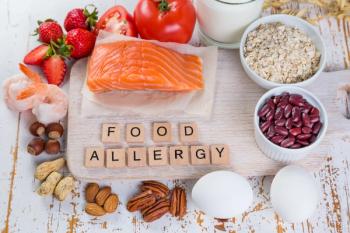
A look at how depression impacts the quality of life for children who have celiac disease.

A look at how depression impacts the quality of life for children who have celiac disease.

Contemporary Pediatrics sat down with Dr. Erin Harrop, an assistant professor at University of Denver in Colorado and a licensed medical social worker to talk about atypical anorexia nervosa, including diagnostic challenges.

Eating disorders carry many risks. An investigation looks into whether they can increase the risk of certain neurodevelopmental conditions in the children of mothers with a history of eating disorders.

Regulations ensure that the advertising of unhealthy foods is limited to children in traditional media. An investigations looks into how celebrity social media may be showing children and adolescents a variety of unhealthy foods and drinks.

A look at what pediatricians need to know right now about food allergies, including the latest allergen to watch out for.

Taxing soda and other sugar sweetened beverages has been seen as a tool to encourage more healthy behaviors. A look at soda consumption in Philadelphia, Pennsylvania provides insight into whether it works.

Dr. Tan shares her must-reads from the October issue.

A history of intestinal injury can create some feeding challenges for infants. Here are some of the causes, feeding guidelines, and approaches to feeding difficulties to use in practice.

Using vegan, plant-based, and vegetarian formulas isn't as easy as an adult choosing to have such a diet and making that choice for an infant can carry consequences.

Immunotherapy offers a way to reduce the number of reactions due to food allergies. However, many people are unaware of what it is, what it does, and the overall safety of the therapy.

The US Food and Drug Administration (FDA) has cleared Fortini™, a formula meant for the nutritional needs of term infants with failure to thrive.

School nurses and nurse practitioners play an important role in assessing the child’s health status related to obesity, potential for co-morbidities, and implementing appropriate management strategies.

Mental health often plays a role in eating disorders. As a result of the pandemic, has there been an increase in eating disorders in teenagers that required medical care?

What’s on the dinner table varies widely from family to family. A new poll offers insight into what factors lead some of those meals to be fast food.

Early exposure to peanuts has been shown to reduce the risk of peanut allergy. Is the same true with cow's milk?

For infants with milk allergies, finding a formula that won't cause a reaction is key to happy feeding times. Parents face a dizzying array of options. Here's a look at them.

As we begin to emerge from the national lockdown due to the COVID-19 pandemic, many pediatricians may find that the already widespread problem of youth-onset obesity is worse than ever.

Although it's one of the most common food allergies, the diagnosis of cow's milk allergies isn't always easy.

Some states require a person to mail in the benefits card or visit a local office to receive more Special Supplemental Nutrition Program for Women, Infants, and Children (WIC) benefits. With the inherent risk of in-person contact or delays in mail, did this lead some families to not participate?

The smell and taste of food are important to digestion and growth. Does providing preterm infants with the smell and taste of milk at feeding times lead to better weight and measurement results?

Fact vs myth when it comes to babies breathing during breastfeeding.

Gastrointestinal concerns are a common reason for a child's visit. This article offers a review of the most common ailments that may lead to that visit.

When a child cannot tolerate cow's milk, the choice of formula should be informed by the condition that precludes the child from consuming cow's milk or breast milk. Here are 4 specialty formula types.

A high-quality diet in early childhood can be just 1 way to combat childhood obesity. However, a recent report indicates that there’s room for improvement.

When trying to determine celiac disease, is it helpful to consider repeated low or moderate anti– transglutaminase immunoglobulin A (TGA-IgA) values?